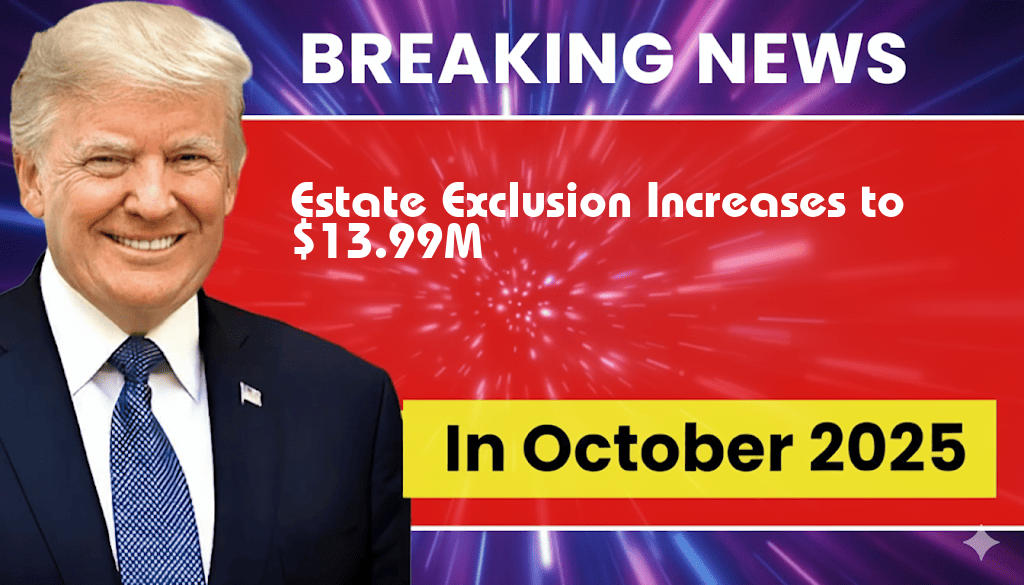Estate Exclusion Rises to $13,990,000, Significantly Benefiting Heirs
The IRS has announced a substantial increase in the federal estate tax exclusion for 2023, raising the amount to $13,990,000 per individual. This change marks an important shift in estate planning for many families, allowing heirs to inherit larger sums without incurring federal estate taxes. The adjustment, which is tied to inflation, aims to alleviate some of the financial burdens associated with wealth transfer upon death. As a result, more individuals can transfer their wealth to the next generation without the fear of significant tax liabilities. This increase not only benefits wealthy families but also influences the strategies employed by estate planners across the country.
Understanding the Estate Tax Exclusion
The estate tax exclusion is the amount an individual can pass on to heirs without having to pay federal estate taxes. In 2022, the exclusion was set at $12,060,000, an increase of approximately 15% for the current year. This adjustment reflects ongoing inflation and is part of a broader trend that has seen the exclusion rise steadily over the past decade.
Who Benefits from the Increased Exclusion?
- High-Net-Worth Individuals: Families with substantial assets will find themselves better positioned to transfer wealth without facing immediate tax consequences.
- Small Business Owners: Entrepreneurs can pass on their businesses to heirs more easily, preserving family legacies.
- Real Estate Investors: Owners of valuable properties can also benefit significantly from the increased exclusion.
Implications for Estate Planning
This increase in the estate tax exclusion has significant implications for estate planning strategies. Here are key considerations for individuals and families:
- Gift Tax Planning: With the exclusion rising, individuals may consider utilizing the increased amount for gifting strategies, potentially reducing the taxable estate even further.
- Trusts and Estates: Establishing trusts can be a strategic move to safeguard wealth and minimize tax implications for heirs.
- Charitable Contributions: Those looking to support charitable causes can do so effectively while reducing their taxable estate through donations.
Potential Challenges Ahead
While the increased estate tax exclusion offers numerous benefits, it is not without challenges. Some experts caution that future changes in legislation could alter the landscape:
- Tax Policy Changes: Political shifts can lead to modifications in tax laws, which may affect the exclusion amount in the future.
- State Taxes: Some states have their own estate taxes, which may not align with federal exclusion rates, potentially complicating estate transfers.
Conclusion
As families navigate the complexities of wealth transfer, understanding the implications of the increased estate tax exclusion is crucial. Financial advisors and estate planners will play a key role in helping clients maximize benefits while minimizing liabilities. With the exclusion now set at $13,990,000, the landscape for estate planning has shifted, providing greater opportunities for many to secure their legacies for future generations.
Additional Resources
| Year | Exclusion Amount |
|---|---|
| 2020 | $11,580,000 |
| 2021 | $11,700,000 |
| 2022 | $12,060,000 |
| 2023 | $13,990,000 |
For more detailed information on the estate tax exclusion, visit the Wikipedia page or explore financial insights from Forbes.
Frequently Asked Questions
What is the new estate exclusion amount for 2023?
The new estate exclusion amount for 2023 has risen to $13,990,000, allowing individuals to pass on more assets to their heirs without incurring federal estate taxes.
How does the estate exclusion benefit heirs?
The increase in the estate exclusion significantly benefits heirs by allowing them to inherit a larger amount of wealth tax-free, thereby preserving more family assets and reducing the tax burden on the estate.
Will the estate exclusion amount continue to change in the future?
Yes, the estate exclusion amount is subject to periodic adjustments based on inflation and legislative changes, so it may vary in future years.
Who qualifies for the estate exclusion?
Any individual can qualify for the estate exclusion if their estate’s total value is below the exclusion limit, which is currently $13,990,000. This includes assets like real estate, investments, and personal belongings.
What should individuals do to plan for the estate exclusion?
Individuals should consult with a financial advisor or estate planning attorney to develop a comprehensive plan that takes advantage of the estate exclusion, ensuring that their heirs benefit from the maximum tax-free inheritance possible.

Leave a Reply